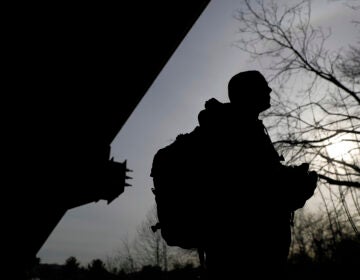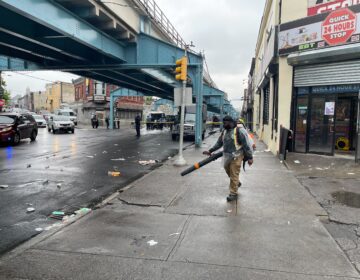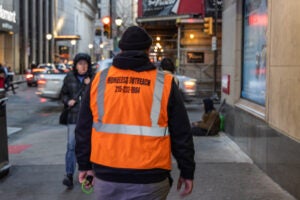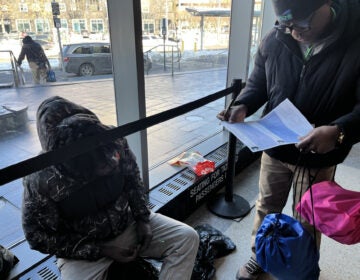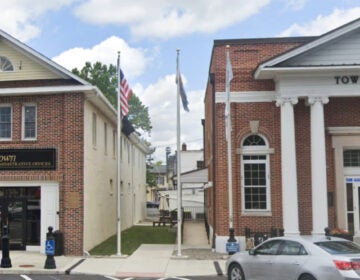Southern Delaware ‘Tent City’ disappears, leaving Georgetown’s homeless in the shadows
An unofficial gathering space for the town’s homeless population was dismantled for development, raising urgent questions about where they would go.
Listen 3:19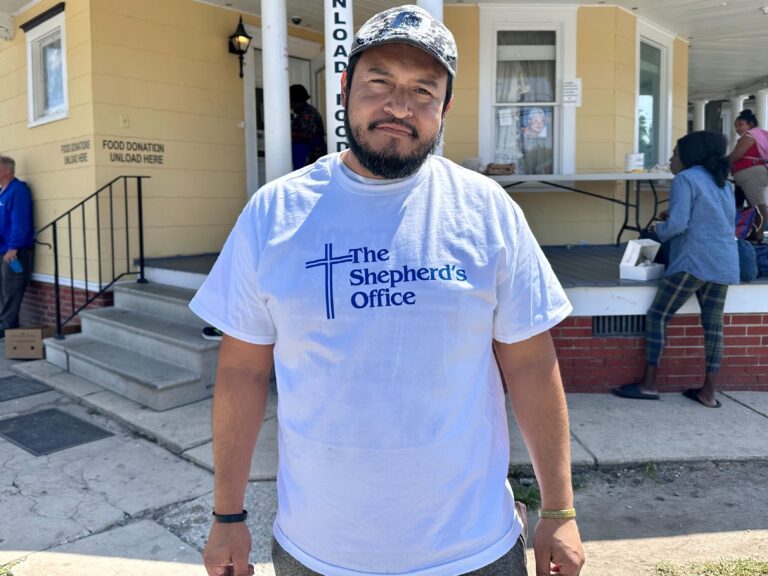
Jose Morales, a handyman and landscaper now housed for 40 days after being homeless for nine months, noticed more unhoused individuals on Georgetown’s streets, each with a backpack of essentials. He believes the town council must step up to support this population. (Johnny Perez-Gonzalez/WHYY)
From Philly and the Pa. suburbs to South Jersey and Delaware, what would you like WHYY News to cover? Let us know!
Just down the block from The Shepherd’s Office in Georgetown, Delaware, at the dead end of Douglas Street near the liquor store, lies what was once “Tent City.”
The space once was a refuge for more than 100 individuals experiencing homelessness in southern Delaware. After the land was purchased for development, the encampment was dismantled. Its entryways have been blocked with stacked logs as tall as an average person’s height. Signs now warn of fines and other penalties for trespassing, leaving the area an empty, abandoned space with little sign of the lives that once sought shelter here.
In recent years, the encampment site has drawn the attention of many and sparked debates about what should come next and the potential impact on the community. Questions are being raised about how or if the town, county or state will support those affected.
Some individuals, either currently or formerly homeless, are concerned about those who once lived at the site and where their lives will go from here.
Georgetown’s 'Tent City,' an encampment for over 100 homeless individuals, has been dismantled, displacing residents. Entrances are blocked by logs and signs warn of fines, leaving the area abandoned and raising urgent questions about their future and the community’s response. pic.twitter.com/gFCphAhvg7
— Johnny Perez (@johnnyperez__) August 26, 2024
‘It’s transition time’
Jim Martin is the director of The Shepherd’s Office, which works to help those experiencing homelessness in southern Delaware. He draws on his own experience with homelessness to guide his work. His organization provides crucial support, offering over 300 warm meals daily and free clothing, as well as morning prayers and Bible studies for those in need.
After 15 years of serving those in need, including people living in the encampment, he said he appreciates the previous landowner who allowed people to stay in the wooded area for more than a decade.
“I don’t even know his name, but I love him because he tried to help over all these years,” he said. “Now it’s transition time. Like, what do we do now? Do we kick all the homeless out of Georgetown?”
With the sale of the land by its private owner, future development plans might be in motion.
“There’s a beginning, a middle and an end to everything, and well, it came to an end. [The previous landowner] gave probably a year’s notice that this day would be coming,” Martin said. “He said ‘Hey, we’re moving forward with development plans here and this is my private property, I’m allowed to develop. So I’m trying to give you guys a heads up.’”
Martin has a solution at his fingertips but said it will take collaboration between government and community leaders to make it a reality.
“It’s a homeless hub,” Martin said of his idea to create a “shanty town,” a centralized location for people experiencing homelessness to live and get connected to services they need.
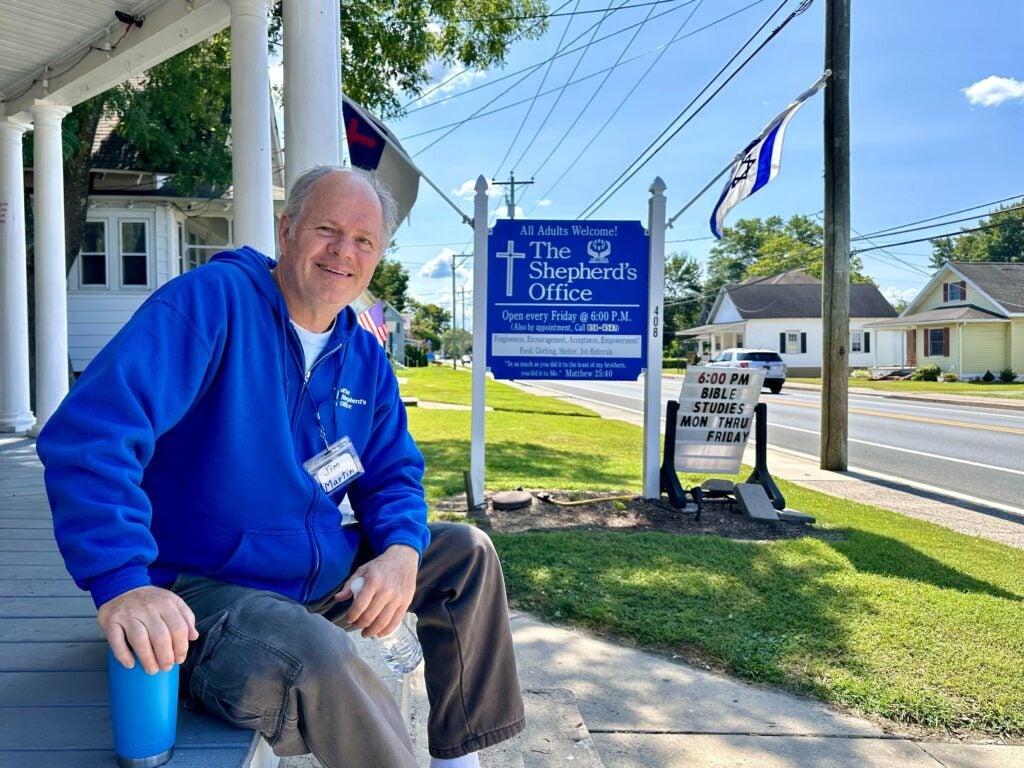
His approach would be a pilot test, aiming to address the needs of the hundreds living without homes in Georgetown and integrate services from key local institutions like Sun Behavioral Health Center, Family Court, child services and the Delaware Division of Motor Vehicles.
“It’s going to be a tough topic, but I think they have to do an overlay over the existing zoning ordinance and just say, ‘Okay, see that five acres over there? Let’s just give that to the homeless,’” he said. “Let them set up a shanty town, because I don’t think the solution is to just let them just disappear somewhere in the woods, somewhere behind a bush.”
“I’m ramping it up to the elected leaders now because we need their help, honestly. [Mayor] Bill West is doing all he can to help them, but we need maybe the county people to help and the state people to help,” he added. “They need a place somewhere.”
Councilmember Tony Neal has lived in Georgetown for nearly his entire life. He currently resides near the railroad tracks, where he could observe people coming and going from the encampment. As an active community member, he joined the town council this year to address local issues, including homelessness, and is collaborating with others to tackle this major concern.
“By me stepping up to the plate and doing what I’m supposed to do, I can make the community better, and now it’s giving me more leverage to reach out to the other people in the community,” he said. “Before I’d seen it, but I never addressed it.”
A few weeks ago, community leaders gathered to discuss pressing issues, with homelessness as a common concern. Neal noted a few potential solutions proposed.
“We just came up with some good solutions. We talked about a few things, but I am working on trying to form a committee to try to talk to certain people,” he said.
After forming his committee, Neal plans to present their solutions to spark discussion with council members, secure additional resources and ultimately make Georgetown a better place to live.
‘It’s a pretty hard life out there’
José Morales, a 43-year-old Guatemalan from Georgetown, faced homelessness after losing his job in the winter, which forced him to give up the place he was renting. He was homeless for roughly nine months and finally secured stable housing about a month and a half ago.
“It’s a pretty hard life out there. And since they were saying they’re going to remove them out of Tent City, it’s going to be pretty tough on them,” he said. “There’s nowhere to put their tents or whatever they sleep in because there’s no places around here.”
Morales quickly noticed the growing number of unhoused individuals taking over the streets of Georgetown, each carrying a backpack filled with daily essentials — just as he once did. Many in this community are left questioning their next move and where they’ll find a place to sleep.
“I see more people in the streets over [at The Shepherd’s Office]. It is packed sometimes. I mean, they don’t know where else to go. Everybody’s talking about they need to find a spot where they can have a place to sleep or at least a shelter or something. For the community, for the homeless people, women and men.”
Many people living at the encampment had run afoul of Georgetown’s prohibitions on camping in town or sleeping in vehicles.
Morales said all of that could have been prevented if the town and county had provided a backup plan instead of simply evicting those individuals. He argues that a shelter should have been established in the town, where currently none exists. The only temporary relief comes during the winter, when churches in the area open as Code Purple shelters from Dec. 1 to March 15.
“There’s none out here. It’s just in the wintertime,” Morales said.
This month marks one year of living without a home for Kasandra Campbell. Her unstable housing journey includes living at motels and various locations across the state — from Milford, Magnolia and Camden to Wilmington, Middletown, Lewes and now Georgetown, where she has been living for the past three months.
Sitting on the porch, Campbell described the encampment as messy and unlawful.
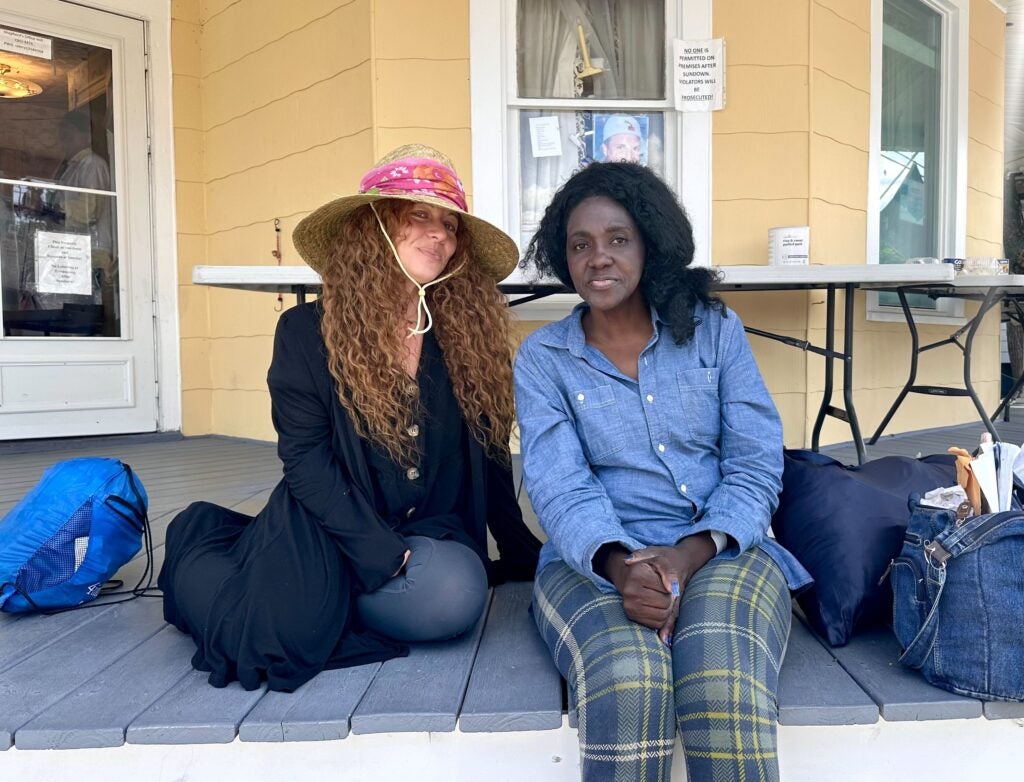
“There was a lot of corruption and breaking the law back there. I do feel for the people having to find a different place to live, but honestly, I think it was probably a good thing to break up that mess,” she said.
While she feels for those who lived there, she was always fearful of entering the forest and, in some ways, is relieved that the encampment was shut down.
“I’m scared to go back there. Girls, they’ve express that they’ve been raped and beat up. People have been stolen from, people are doing bad drugs and overdosing back there, and that’s just not for me,” Campbell said. “I like to hang around where I feel safe.”
She’s trying to make the best of her situation and hopes for change, believing it depends on what town leaders and decision-makers do next.
“If you’re saying that you care about homelessness and you want to [uplift] the community, I think that putting your money where your mouth is would be a great way to show everyone how much you care,” she said.
WHYY is your source for fact-based, in-depth journalism and information. As a nonprofit organization, we rely on financial support from readers like you. Please give today.



